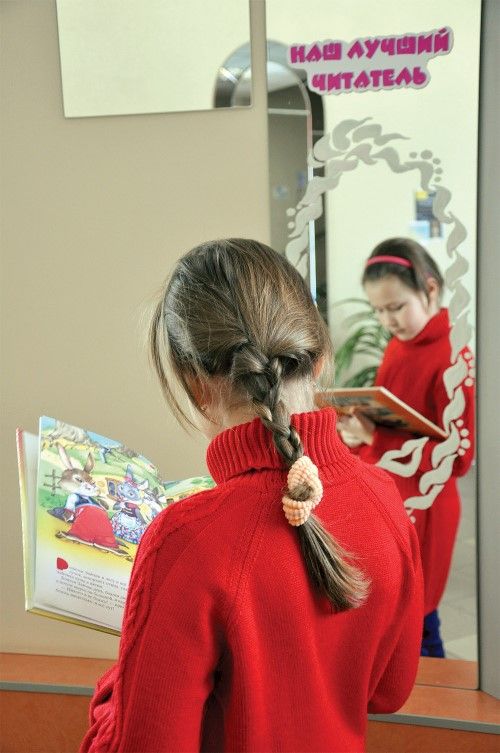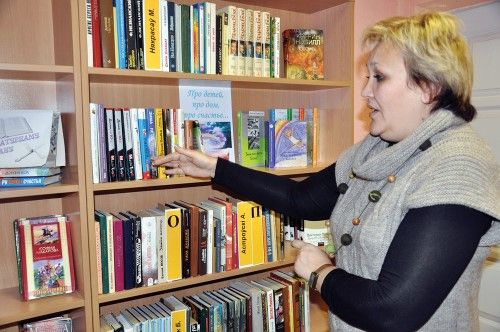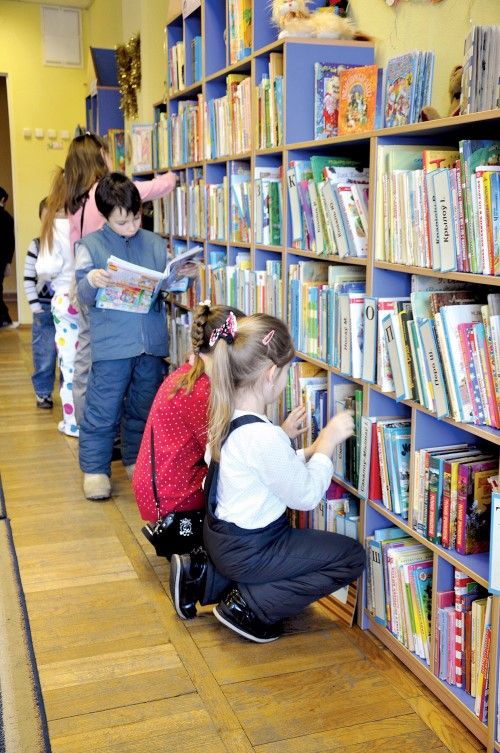
How should we be raising our children: the future of Belarus, this layer of ‘blank leaves’? We often compare a young life to a book, on which life’s experiences and knowledge are written. In this connection, what can our modern libraries offer children? In my opinion, they have a special mission: to teach life’s truths — of good and harm — and to delight and surprise those pure minds.
I admit that I haven’t been to an adult library for a long time and it’s been even longer since I’ve ventured inside a children’s library. However, I happened to hear some young mothers with their prams talking about lessons offered every Tuesday in the reading room of children’s library #10, in Minsk’s Pervomaisky District. All interested persons are invited, free of charge (a pleasing notion). It seemed the ideal opportunity to learn about library activities.
In fact, the classes are very informal and seem to be for the benefit of mothers (making origami while sharing their thoughts on parenthood) as much as for the tireless children, who rush to play with the toys. Of course, the real aim is to engender a love of reading among children. Even those hardly able to stand point to the multi-coloured shelves, requesting a book to peruse. Moreover, they treat each edition with care, as if subconsciously respectful.
The head of children’s library #10, Yulia Sermyazhko — kind and affable, with a soft, kind smile and boundless energy — organizes the lessons. During a break, she invites us to the conference hall, to admire a display of art works, telling us that the artist is soon due to arrive. In the corridor, adverts promote the ‘film mania’ project, and offer an invitation to the multimedia centre, and to a master class on scrapbooking: all ideas from the director of the library.

Ms. Sermyazhko, gushing with generous creativity, was happy to share her views:
What inspired you to create the ‘children’s club for fans of reading’? Nobody obliged you to do so…
About 20 years ago, I had small children and loved helping them learn about the world around them. When they became teenagers, I then wanted to examine the problems associated with this difficult age, creating a circle for teenagers, at Minsk libraries where I’d earlier worked. They liked to study with us.
Not so long ago, I gave birth to my third child, and began the first vital stages again. By that time, various children’s educational centres had sprung up but most weren’t interested in child development, as such. However, like libraries, they have plenty of books: we have 58,000 editions! Of course, any parent can take a book and practise with their children, but some feel more comfortable in an organized environment. Of course, by law, access to books is free of charge.
Is ‘sheer enthusiasm’ enough?
You can go far on an attitude of ‘sheer enthusiasm’: on what did we build the Soviet Union but ‘sheer enthusiasm’? I have it in abundance and enjoy encouraging my employees, sharing guidelines.
As far as I know, you lack a wide range of equipment: do mothers bring plasticine, pencils and so on?
Yes, we have only books and the desire to succeed. Last year, I brought everything necessary from home and I still do, but we also ask parents to bring multi-coloured napkins, glue, cardboard, balls or whatever they have to hand.
Can you describe the lessons?
I must emphasize that we aren’t teachers or psychologists; we are librarians. Our task is not to impart knowledge but to teach youngsters how to learn from books: how to access each edition’s knowledge. There is so much information in the world that even an adult can be overwhelmed, so we direct people according to their interests. Secondly, our lessons are adapted to suit the age of the children. If the weather is bad it’s hard to spend time outside, so our lessons are popular, allowing youngsters somewhere to ‘let off steam’.

Do you remember your first pupils?
Certainly! At first, we had hardly anybody come to us but we placed an advert on social networks and so on, which brought Yan and Marina to us, then increasingly more people — through ‘word of mouth’. Last year, we had just 16 people in our group; this year, we have about 60 children. We don’t need to advertise any more.
What other projects have you planned?
Visiting the library is an obligatory element of the school curriculum, so holidays are busy. Besides classes with families, to develop small children’s skills, we are planning art exhibitions, inviting artists to join us, alongside other interesting people. Recently, Belarusian writers Andrey Zhvalevsky, Yevgenia Pasternak and Maria Bershadskaya paid us a visit; their books flew off the library shelves afterwards! We hold morning lessons during every school holiday and organize small-scale activities, such as teaching children the days of the week.
We also have a game for older children, where a particular shelf’s books are all wrapped in white paper, creating a ‘blind date’ lottery. It encourages them to read a book they might not otherwise select. We then ask them to write their opinion of the book on a hanging paper heart. The activity informs us of youngsters’ preferences.
Another activity involves knitting a scarf of friendship: anyone can take part. If you don’t know how to knit, you can turn to the ‘How to Knit’ book for advice. Our staircase bears greetings in various languages: ‘привет’, ‘прывітанне’ and ‘hello’. These visual pointers to the road to knowledge show that you can learn little by little.
We also hope to modernize our multimedia centre and launch a new project entitled ‘Play, company!’ — including games like ‘Mafia’ and ‘Svintus’ which teach children how to communicate. Rather than ‘lecturing’ children, we encourage them to be interactive, discovering the joy and fascination of learning for themselves.
Are all Minsk libraries moving in this direction?
Certainly, it seems to be so. The National Library of Belarus has a children’s creche, where parents can leave their children, while they study in the reading room. There is a museum of books and an observation platform on the roof, from which you can view the whole capital. Every Saturday, the central city library (named after Yanka Kupala) holds activities for families.
Adult libraries organize events for children, while Minsk also has 18 libraries oriented purely towards school and preschool age youngsters. Library #13, in Minsk’s Sosny suburb, is a unique cultural-educational centre, while libraries #14 and #17 are also running interesting ‘features’. Everyone is eager to bring in readers, to justify their existence. We have to show that we are still relevant and find our niche in this changing world, where there is a tendency to read fewer books.

Surely our country is experiencing this tendency to a lesser degree? What do you think?
In Soviet times, a book was the best gift, and those who failed to visit libraries were considered to be missing out. However, some like to read and some don’t; we are all different. New technologies, gadgets and the Internet don’t prevent us from reading. My daughter, now 21, reads always and everywhere. She began with paper editions but then started downloading electronic books onto her mobile phone: then, onto her reader and tablet. My son, aged 22, did not read in childhood and still has no desire, but enjoys audiobooks. Some children read continuously while others read ‘nothing’ yet learn from other sources.
Perhaps, from cartoons?
Perhaps. Our project ‘film mania’ allows us to suggest watching a film based on a book, so that we can discuss it and hold a quiz. We introduce Pushkin via ‘The Golden Cockerel’, and such works as ‘Idiot’ and ‘The Brothers Karamazov’ by Dostoevsky, as well as ‘The Master and Margarita’ by Bulgakov. Demand for these books rises rapidly once youngsters have watched a film version. This is no bad thing. All sources of information complement each other.
Do you read everything on the shelves of your library?
Not these days; there’s too much for the human brain to digest. Perhaps, younger minds can do so, but I cannot! As a ‘book gourmet’, I choose editions. My other librarians read, according to their interests, which prompts discussion. Every self-respecting librarian should know the content of the books they have available and be able to answer even tricky questions.
When I was younger, I had an interesting case, where a boy asked for Belkin’s stories. I looked through the catalogue, the shelves and, even, the depository but there was no such book! After some time, I understood that he wanted the story Squirrels, by Pushkin! It’s important not to dismiss any request, even if a child simply asks for a blue book with dogs.
Recently, I was asked for ‘Fifty Shades of Grey’ (a new film based on the book is soon to be released). I hadn’t heard about it but bibliographic reviews and searches online revealed all.
Can modern prose become a classic?
Think of the commotion caused by Nabokov’s ‘Lolita’, which is now a classic. Meanwhile, the popularity of the ‘moomins’ series (now largely forgotten) allowed its author to buy an island: it is a classic too.
Which genres and authors are most in demand these days?
People often ask for something complex and of good quality, having become bored with ‘easy’ literature. There isn’t a big rush to read Chekhov and Dostoevsky but people are reflecting on serious literature.
Do you think that the great writers of past times reflected more on the eternal and that people were more spiritual?
Spirituality continues today: life isn’t ‘black and white’ after all. Our world has many sides and we must learn to live in it; reading can help us gain wisdom to do so.
By Alisa Krasovska











